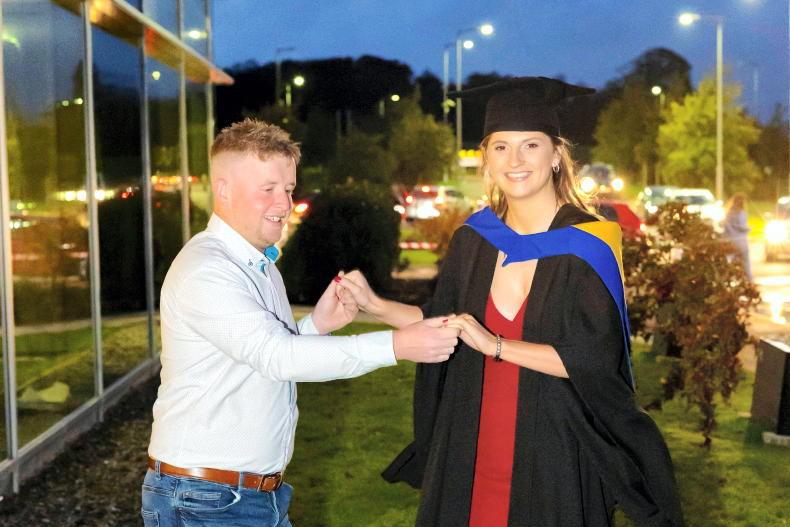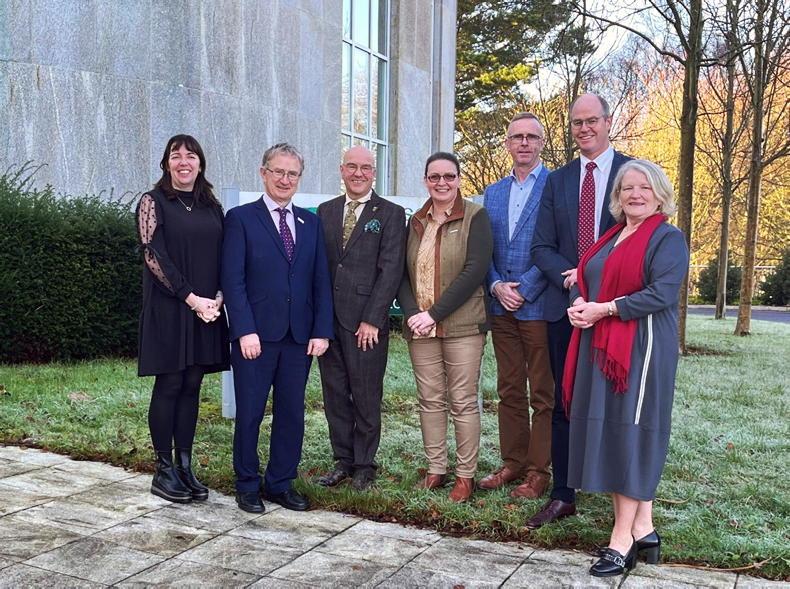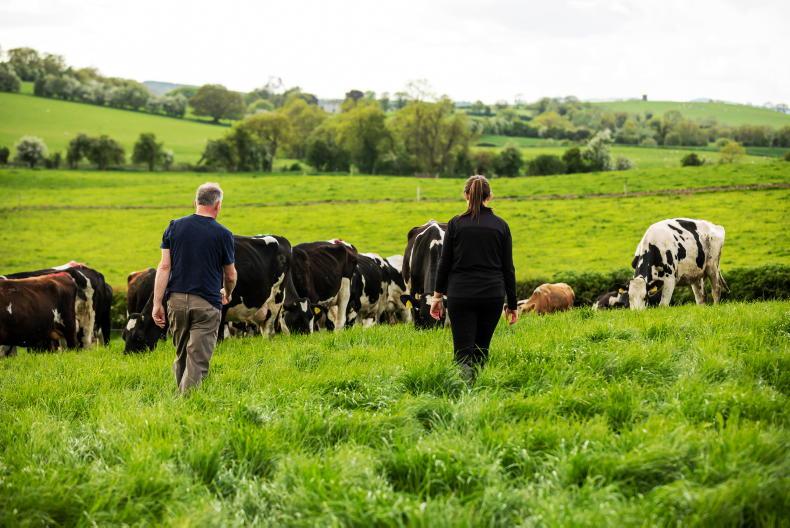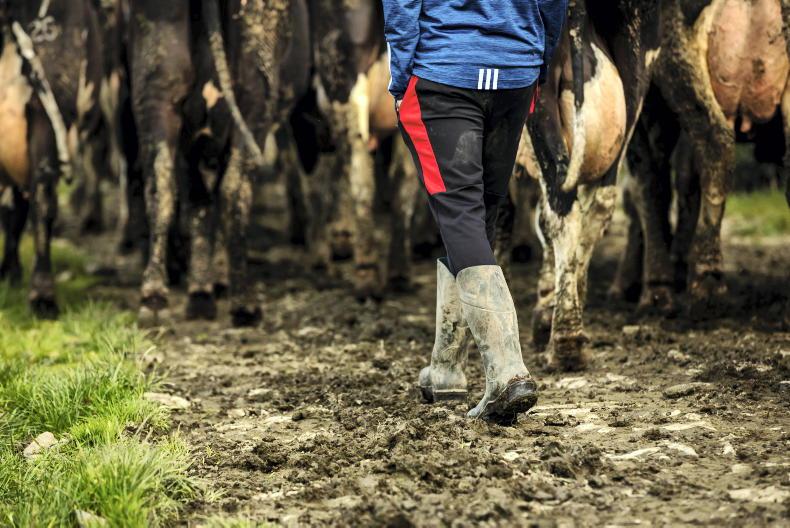Dairy farming as a career appeals to people from a range of different perspectives. For one, farming might be about working outdoors, or the opportunity to become your ‘own boss’. For another person, farming appeals simply because they enjoy business and the growth of the business around them. You may enjoy working with your hands as well as your head.
Education in agriculture is on the rise over the last couple of years with many new courses and programmes. Students are spoilt for choice and are left with a decision to decide which course will suit them best. Careful consideration must be given to picking the right course and important questions must be asked.
What qualification do I require?What course will lead to the qualification I require?Does it suit my current work situation?Is the green cert what I need or is an alternative third-level course in agriculture a better option to qualify me as young trained farmer? If I don’t get the points for a straight entry into a degree course, what options and backdoor routes do I have?There are courses available across the nation at all different levels, but the Certificate in Agriculture – more commonly known as the green cert is the most traditional route for young farmers to qualify for Department of Agriculture schemes such as the young farmers scheme and TAMS (Targeted Agricultural Modernisation Scheme).
Green Cert
There are three ways in which students can now obtain their green cert from agricultural colleges while being obtainable from higher level education courses.
1. Full Time course in Agricultural Colleges – This begins with a Level 5 Certificate in Agriculture. Applicants for the full-time programme must be 17 years old or over on 1 January following entry to the course. The course is split 50:50 between practical and theory and includes two four-week work placements on farms. This course is a one-year duration and will be of most benefit to anyone who has completed the senior cycle at second level.
Following from this is a Level 6 advanced certificate in dairy herd management. This is a one-year full-time course and entry requirements is a Level 5 certificate in agriculture at minimum. Students spend 20 weeks in college working on both theory and practical course work. There is a 16-week practical learning period on a trained farmer’s host farm. While most complete this experience on dairy farms in Ireland, there are opportunities for completing the practical learning period in New Zealand, USA, Australia and Europe.
Both the level 5 and level 6 courses can be completed across the country in Ballyhaise College, Clonakilty College, Gurteen College, Kildalton College, and Salesian Agricultural College.
2. Part-time course – This course is available to students over 23 years old. The duration of the course is two and a half years on a part-time basis. The course is also run in agricultural colleges across the country. Students will attain a Level 6 specific purpose in farming certificate on completion of this course.
3. Distance Education – This course meets the training requirements of graduates from other non-agricultural programmes who are interested in farming. Applicants must hold a Level 6 or higher in a non-agricultural discipline and the duration of the course is 15-18 months. On completion of this course, students will also attain a Level 6 specific purpose in farming certificate.
Applications for all certificate courses above are applied directly to the colleges and do not require any CAO points.
Higher Education Apprenticeships
New to the list of the many routes into the dairy industry are two farm apprenticeships. These apprenticeships are a farm technician apprenticeship and the farm manager apprenticeship. The first students from both courses began in September 2023 and this is aimed at replacing the Level 7 farm management diploma run in Moorepark.
Farm Technician Apprenticeship
The farm technician apprenticeship provides knowledge of farm operations with a strong foundation in sustainable agriculture production, health and safety, quality assurance, business, and work organisation skills. This programme allows students to earn while they learn while gaining valuable experience on commercial farms.
The course duration is two years with 10 weeks ‘off the job’ learning will be held in Ballyhaise or Clonakilty Agricultural colleges. There will also be opportunity for students to visit leading commercial farms throughout their time. Upon qualification, farm technicians will receive a Level 6 certificate in technical farm operations.
Applicants must be 18 years old on entry and hold a Level 5 certificate in agriculture. They can also have worked for two years in a land-based sector such as a farm.
Farm Manager Apprenticeship
The Farm Manager Apprenticeship is for anyone interested in a managerial career in the agricultural sector. The course provides the latest research and best practice management knowledge to successfully run a commercial farm business.
The duration of this course is two years with 10 weeks ‘off the job’ learning in Kildalton Agricultural College. Upon qualification, farm managers will receive a Level 7 Bachelor of Science in Professional sustainable farm management.
Applicants must hold a Level 6 advanced certificate in Agriculture and must be employed by a SOLAS approved host farmer. Teagasc has reported that up to 100 farms have registered with SOLAS to be approved as a host farmer. There will be 30 places in both courses filled by students in year one of the course.
Higher Education Opportunities
The number of leaving cert students who chose an agricultural course on their CAO in 2023 is up 16% on 2022. This is a positive change for the industry seeing young people actively interested in the industry.
Level 8 entry requirements remain high with University College Cork (UCC) at 496 points, University of Galway (UG) at 423 points, University College Dublin (UCD) at 400 and SETU (Waterford) at 382 points.
Teagasc is an education partner with a range of different universities and institutes of technology across Ireland. These partnerships consist of the Munster Technological University (MTU – Cork and Kerry campuses), Dundalk Institute of Technology (DkIT), Atlantic Technological University (ATU – Galway), Technological University Shannon (TUS – Midlands Midwest), South East Technological University (SETU – Waterford), University College Dublin (UCD), University College Cork (UCC) and University of Galway.
Graduates of Teagasc further education may be eligible for advanced entry to Teagasc linked higher education courses upon completion of their certificate subject to conditions and criteria of the partner higher education institution. Apart from this, entry requirements for all higher education courses must be applied through the central application office (CAO).
Dairy farming as a career appeals to people from a range of different perspectives. For one, farming might be about working outdoors, or the opportunity to become your ‘own boss’. For another person, farming appeals simply because they enjoy business and the growth of the business around them. You may enjoy working with your hands as well as your head.
Education in agriculture is on the rise over the last couple of years with many new courses and programmes. Students are spoilt for choice and are left with a decision to decide which course will suit them best. Careful consideration must be given to picking the right course and important questions must be asked.
What qualification do I require?What course will lead to the qualification I require?Does it suit my current work situation?Is the green cert what I need or is an alternative third-level course in agriculture a better option to qualify me as young trained farmer? If I don’t get the points for a straight entry into a degree course, what options and backdoor routes do I have?There are courses available across the nation at all different levels, but the Certificate in Agriculture – more commonly known as the green cert is the most traditional route for young farmers to qualify for Department of Agriculture schemes such as the young farmers scheme and TAMS (Targeted Agricultural Modernisation Scheme).
Green Cert
There are three ways in which students can now obtain their green cert from agricultural colleges while being obtainable from higher level education courses.
1. Full Time course in Agricultural Colleges – This begins with a Level 5 Certificate in Agriculture. Applicants for the full-time programme must be 17 years old or over on 1 January following entry to the course. The course is split 50:50 between practical and theory and includes two four-week work placements on farms. This course is a one-year duration and will be of most benefit to anyone who has completed the senior cycle at second level.
Following from this is a Level 6 advanced certificate in dairy herd management. This is a one-year full-time course and entry requirements is a Level 5 certificate in agriculture at minimum. Students spend 20 weeks in college working on both theory and practical course work. There is a 16-week practical learning period on a trained farmer’s host farm. While most complete this experience on dairy farms in Ireland, there are opportunities for completing the practical learning period in New Zealand, USA, Australia and Europe.
Both the level 5 and level 6 courses can be completed across the country in Ballyhaise College, Clonakilty College, Gurteen College, Kildalton College, and Salesian Agricultural College.
2. Part-time course – This course is available to students over 23 years old. The duration of the course is two and a half years on a part-time basis. The course is also run in agricultural colleges across the country. Students will attain a Level 6 specific purpose in farming certificate on completion of this course.
3. Distance Education – This course meets the training requirements of graduates from other non-agricultural programmes who are interested in farming. Applicants must hold a Level 6 or higher in a non-agricultural discipline and the duration of the course is 15-18 months. On completion of this course, students will also attain a Level 6 specific purpose in farming certificate.
Applications for all certificate courses above are applied directly to the colleges and do not require any CAO points.
Higher Education Apprenticeships
New to the list of the many routes into the dairy industry are two farm apprenticeships. These apprenticeships are a farm technician apprenticeship and the farm manager apprenticeship. The first students from both courses began in September 2023 and this is aimed at replacing the Level 7 farm management diploma run in Moorepark.
Farm Technician Apprenticeship
The farm technician apprenticeship provides knowledge of farm operations with a strong foundation in sustainable agriculture production, health and safety, quality assurance, business, and work organisation skills. This programme allows students to earn while they learn while gaining valuable experience on commercial farms.
The course duration is two years with 10 weeks ‘off the job’ learning will be held in Ballyhaise or Clonakilty Agricultural colleges. There will also be opportunity for students to visit leading commercial farms throughout their time. Upon qualification, farm technicians will receive a Level 6 certificate in technical farm operations.
Applicants must be 18 years old on entry and hold a Level 5 certificate in agriculture. They can also have worked for two years in a land-based sector such as a farm.
Farm Manager Apprenticeship
The Farm Manager Apprenticeship is for anyone interested in a managerial career in the agricultural sector. The course provides the latest research and best practice management knowledge to successfully run a commercial farm business.
The duration of this course is two years with 10 weeks ‘off the job’ learning in Kildalton Agricultural College. Upon qualification, farm managers will receive a Level 7 Bachelor of Science in Professional sustainable farm management.
Applicants must hold a Level 6 advanced certificate in Agriculture and must be employed by a SOLAS approved host farmer. Teagasc has reported that up to 100 farms have registered with SOLAS to be approved as a host farmer. There will be 30 places in both courses filled by students in year one of the course.
Higher Education Opportunities
The number of leaving cert students who chose an agricultural course on their CAO in 2023 is up 16% on 2022. This is a positive change for the industry seeing young people actively interested in the industry.
Level 8 entry requirements remain high with University College Cork (UCC) at 496 points, University of Galway (UG) at 423 points, University College Dublin (UCD) at 400 and SETU (Waterford) at 382 points.
Teagasc is an education partner with a range of different universities and institutes of technology across Ireland. These partnerships consist of the Munster Technological University (MTU – Cork and Kerry campuses), Dundalk Institute of Technology (DkIT), Atlantic Technological University (ATU – Galway), Technological University Shannon (TUS – Midlands Midwest), South East Technological University (SETU – Waterford), University College Dublin (UCD), University College Cork (UCC) and University of Galway.
Graduates of Teagasc further education may be eligible for advanced entry to Teagasc linked higher education courses upon completion of their certificate subject to conditions and criteria of the partner higher education institution. Apart from this, entry requirements for all higher education courses must be applied through the central application office (CAO).









SHARING OPTIONS